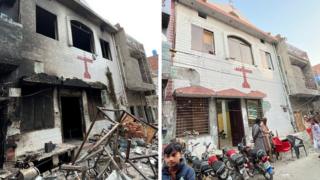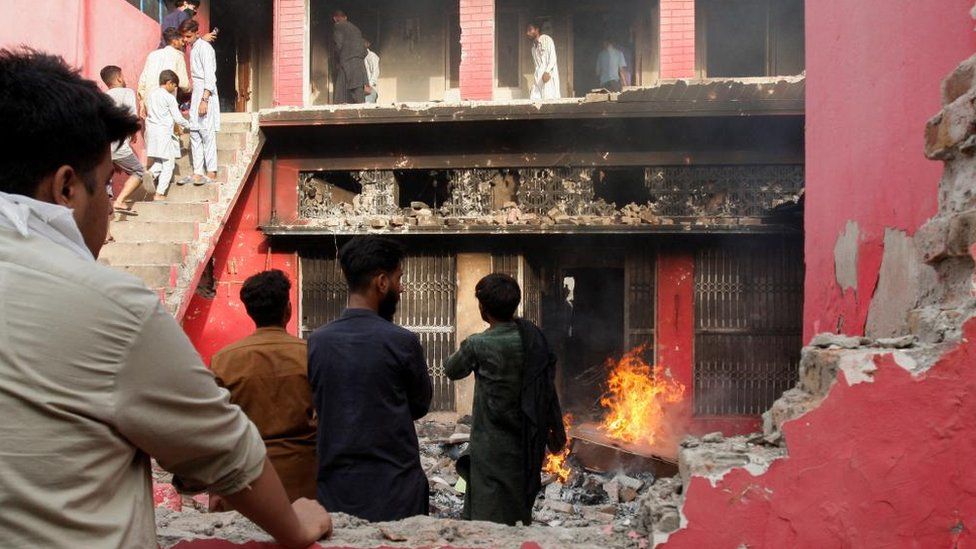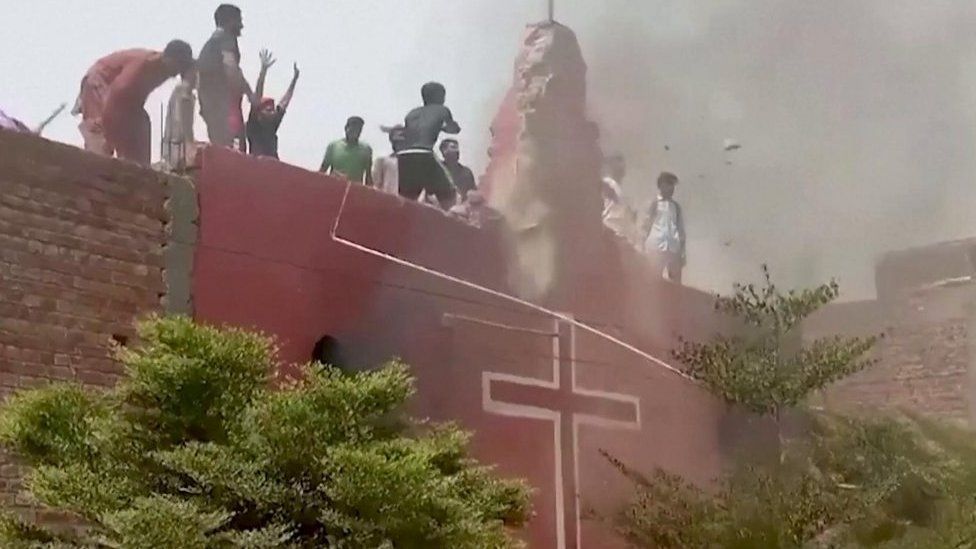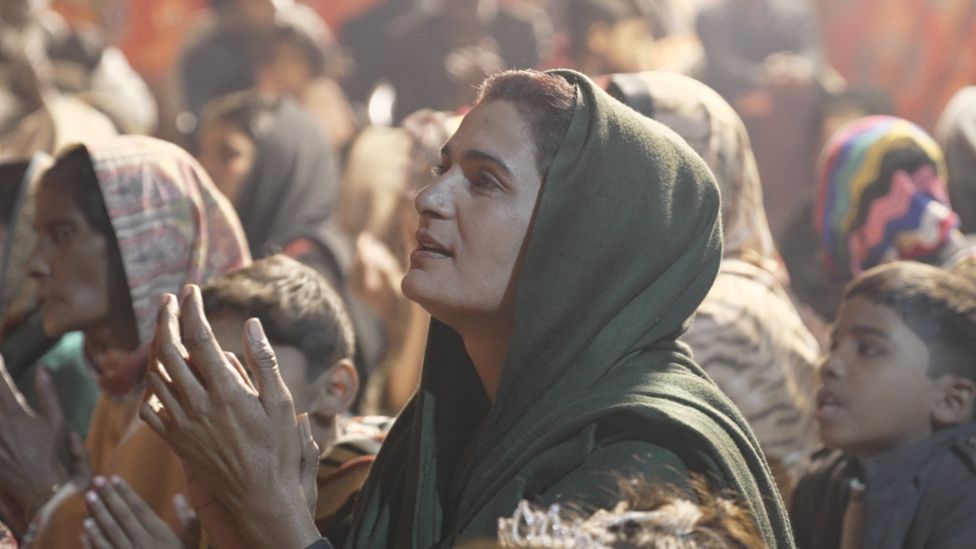
Four months ago, the Christian community in the city of Jaranwala, in north-eastern Pakistan, saw two dozen churches and tens of homes ransacked by hundreds of protestors. In the aftermath, the government promised money to help rebuild. But as they prepare for Christmas, many here are still living with the damage and shock of the attack.
The Christmas carol procession lurches its way through Jaranwala’s back streets, gathering singers as we go.
We start at the church, the pastor, two drummers, 15 or so enthusiastic singers, lighting the way through the dark streets with phone torches. With each turn more come to their doors to join.
Children are dressed in their Christmas best, some belting out their favourite carol lines. Others shyly join in, dressed in sparkly dresses with glittery bows, Father Christmas hats and light-up trainers, stomping through the streets. Some of the older boys throw small firecrackers, giggling as their mothers shout at them for making them jump.
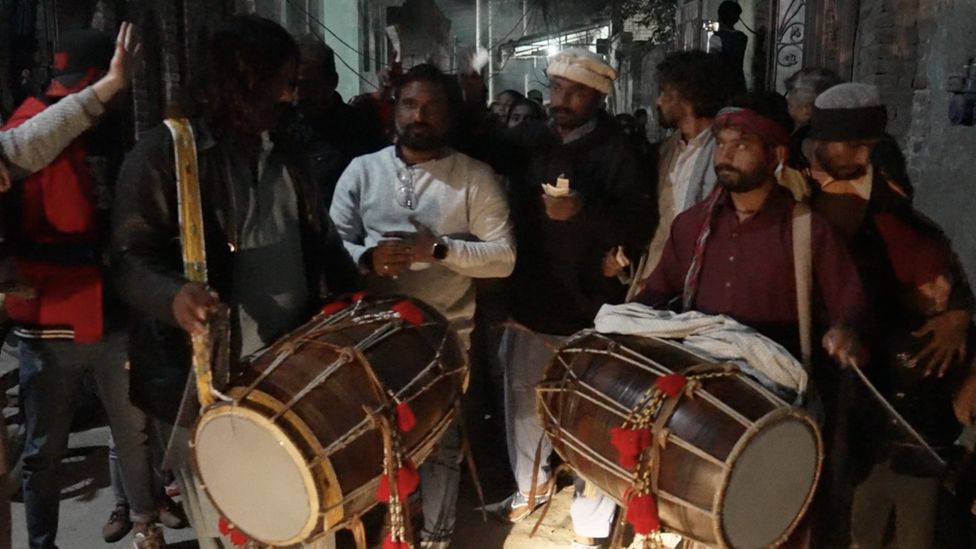
Christmas traditions in Jaranwala have a renewed importance to Pastor Rizwan Mill this year.
“Christmas now is in all our hearts,” he says, taking a small break from leading the congregation. “Christ is a saviour for me. He saved me during the hours of the attack. He is all our saviour.”
On 16 August, thousands gathered in Jaranwala, angry at allegations that someone from the Christian community had deliberately damaged pages from the holy Quran. People were being accused of blasphemy.
The crowd turned violent, attacking churches and private homes. Many from the Christian community fled, spending the night in open fields, fearful of returning to the city. While nine police officers were injured, no civilian lives were lost.
The police promised justice, arresting more than 350 people, while the government promised to help rebuild both trust and the buildings.
The authorities have said that all 22 churches that were attacked have now been renovated and reopened – the walls are still crisp with fresh paint and the floors have that new carpet smell.
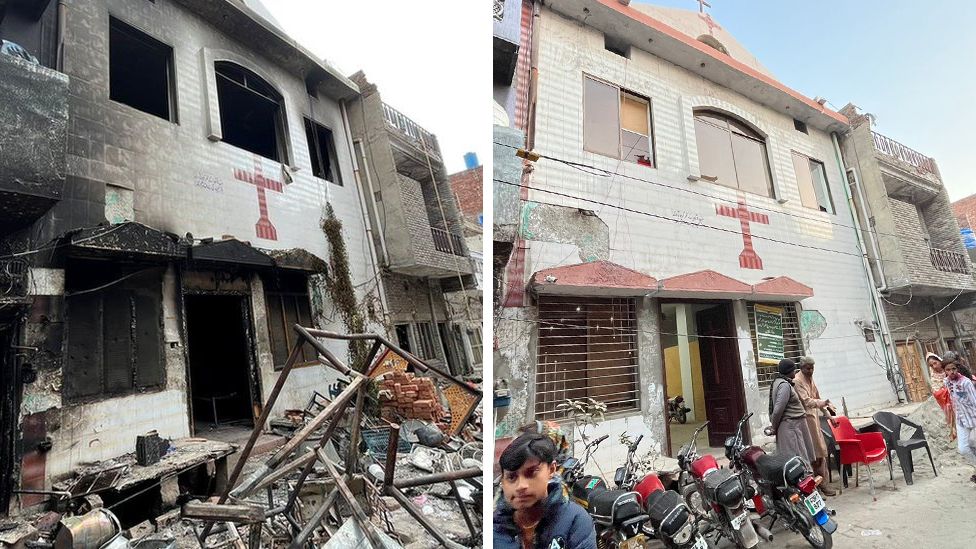
Alongside money from the government, there have been works and donations by charities, NGOs and outreach programmes between local mosques and churches.
But four months later, some homes still show the scars of that night.
We find Saima sitting in the one room of her home still intact, surrounded by blackened walls. The money has been paid, she says, but once divided amongst all the relatives who live in the building, it wasn’t enough. The damage was extensive and the repair work is taking time.
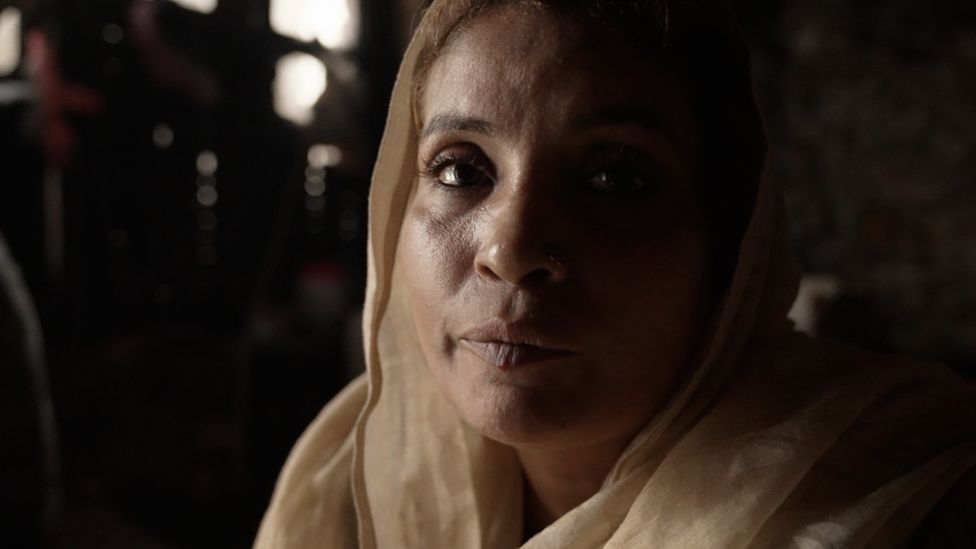
“This was a very beautiful house,” she tells me.
“My parents built it, they saved every penny for it. It takes a whole lifetime to build a house. And now it’s all burnt. Whatever we had, it’s all burnt.”
She says the whole household – including her, her siblings and their children, four families in total – were given two million rupees, around $7,100 (£5,586).
Some of that money has gone on rent for those who can’t stay in the house. Now it is just Saima and one sister-in-law that live in the only habitable room.
“We are so tired,” she tells me quietly. She begins to cry. “In this one room, there is no facility, there is no light, no water, we don’t have anything. We just want this house to be rebuilt.”
The authorities in Jaranwala told the BBC that 78 households were identified by a damage assessment committee and given two million rupees each. The amount, they stated, was decided after examining the damage of each house.
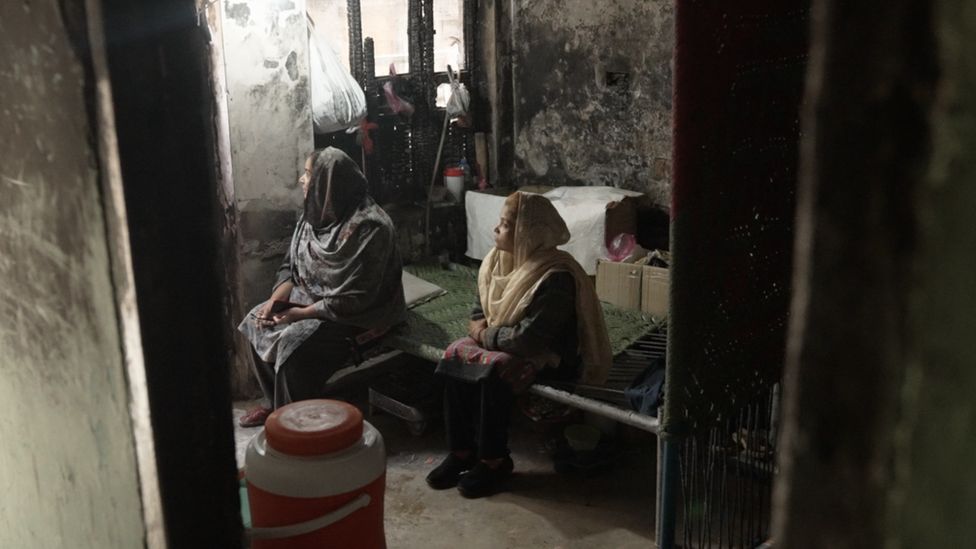
Across the road, work is still underway at Sonam’s house.
When we visited in August, one bedroom was still smouldering, another had a broken window. The bed had been thrown from the first floor to the street.
Now the rooms are repainted, with new furniture – although the bedroom door still has blunt holes, hacked into the wood by rioters. The memories too are still close to the surface.
“We don’t feel safe here,” Sonam says.
“The fear that entered our hearts is still there. Any shouting in the street, everyone goes out to see what is happening because we are so scared. It’s very hard to trust again.”
“As a society and as a police force we have to rebuild trust,” says Captain Ali Zia, city police officer. “Both have already done a lot to do that.”
But there is still some lingering anger.
At the time of the attacks, some criticised the police for failing to stop the damage or step in before the crowd got of control.
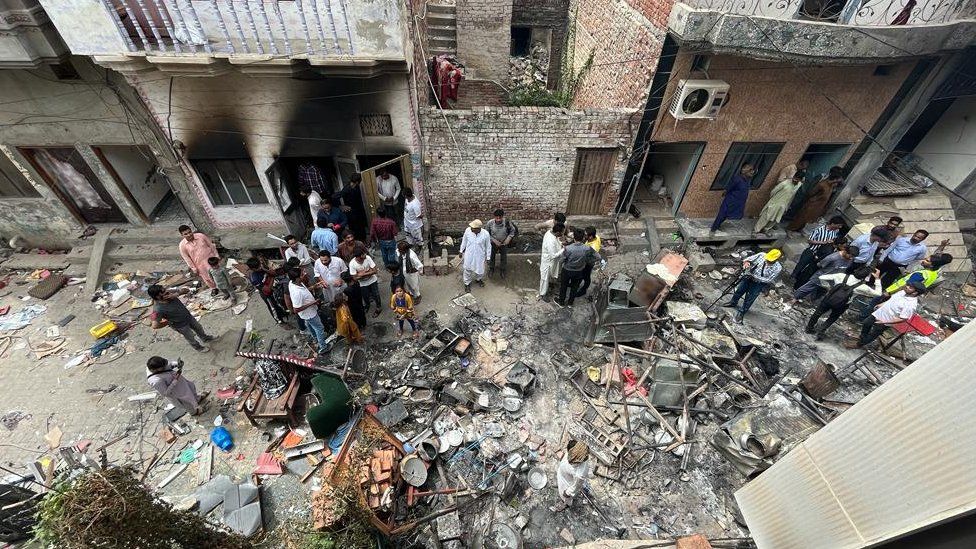
“Our first priority was to save lives,” says Captain Zia. “The second was to save property. Nine of the police officials were injured that day; the police did take the brunt. By and large we do have people’s trust.”
Police say around a quarter of the 350 originally arrested are still in prison. The others are out on bail, but authorities are adamant cases will still be brought against them.
“There is a process of law,” Captain Zia says. “The police department and the government are two of the biggest stakeholders here. We want to show that this act won’t be tolerated in the future. If we don’t ensure justice, it will keep happening.”
Captain Zia says he hopes the court cases will start early in 2024. Until then, the police are loath to be drawn on details of both the blasphemy case and the violent mob. But of the violence in the streets, police say there is no indication that the reaction was pre-planned and instead believe the call to protest was spontaneously spread through social media.
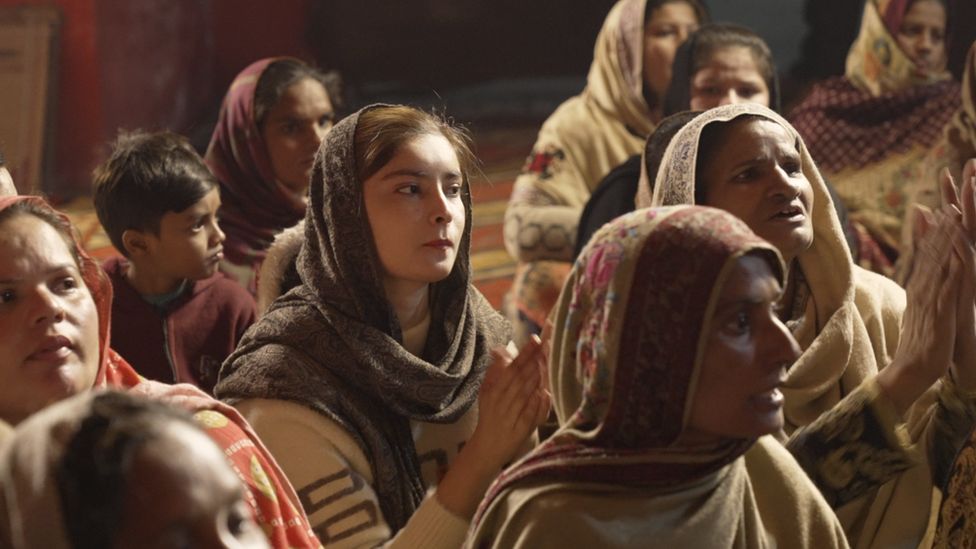
In Jaranwala, the carol procession finally winds its way back to the church where it began.
The children begin to show their carefully rehearsed Christmas dance routines, performing on a stage papered with pictures of snow men, Christmas trees and Father Christmas.
In August this was one of the churches still smouldering hours later.
“We still feel that moment,” Saima tells me. “But we hope that whatever has passed has passed. That is what we want. That is what we pray for.”

